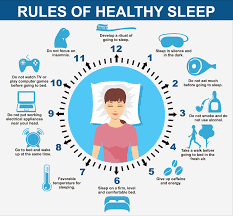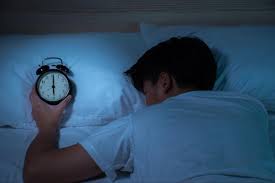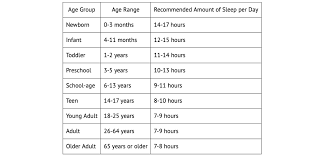The Importance of Sleep Hygiene: Tips for a Good Night’s Rest
Quality sleep is essential for overall health and well-being. Poor sleep can lead to a range of issues, including fatigue, mood disturbances, and decreased cognitive function. By practicing good sleep hygiene, you can improve the quantity and quality of your sleep. Here are some tips to help you establish healthy sleep habits:
Avoid Stimulants Before Bedtime
Avoid consuming stimulants such as caffeine and nicotine close to bedtime. These substances can interfere with your ability to fall asleep and stay asleep.
Create a Relaxing Bedtime Routine
Establish a calming bedtime routine to signal to your body that it’s time to wind down. This could include reading a book, taking a warm bath, or practicing relaxation techniques like deep breathing or meditation.
Maintain a Consistent Sleep Schedule
Try to go to bed and wake up at the same time every day, even on weekends. Consistency helps regulate your body’s internal clock and can improve the quality of your sleep.
Create a Comfortable Sleep Environment
Your bedroom should be conducive to sleep. Keep the room cool, dark, and quiet. Invest in a comfortable mattress and pillows that support good posture.
Avoid Electronic Devices Before Bed
The blue light emitted by screens can disrupt your body’s production of melatonin, a hormone that regulates sleep. Avoid using electronic devices such as smartphones or tablets at least an hour before bedtime.
Limit Daytime Naps
If you nap during the day, keep it short (around 20-30 minutes) and avoid napping late in the afternoon or evening. Long or late naps can interfere with your ability to fall asleep at night.
Exercise Regularly
Regular physical activity can promote better sleep. Aim for at least 30 minutes of moderate exercise most days of the week but avoid vigorous exercise close to bedtime.
By incorporating these tips into your daily routine, you can improve your sleep hygiene and enjoy more restful nights. Remember that everyone is different, so it may take some trial and error to find what works best for you. Prioritize good sleep hygiene for better overall health and well-being.
9 Essential Tips for Optimal Sleep Hygiene
- Maintain a consistent sleep schedule by going to bed and waking up at the same time every day, even on weekends.
- Create a relaxing bedtime routine to signal your body that it’s time to wind down, such as reading a book or taking a warm bath.
- Ensure your sleep environment is conducive to rest by keeping your bedroom dark, quiet, and cool.
- Limit exposure to screens (phones, tablets, computers) before bed as the blue light can interfere with melatonin production.
- Avoid consuming caffeine and heavy meals close to bedtime as they can disrupt your sleep.
- Get regular exercise during the day but avoid vigorous physical activity close to bedtime.
- Limit naps during the day, especially in the late afternoon or evening, as they can make it harder to fall asleep at night.
- Manage stress through relaxation techniques like deep breathing exercises or meditation before bed.
- If you’re struggling to fall asleep after about 20 minutes, get out of bed and do something calming until you feel sleepy.
Maintain a consistent sleep schedule by going to bed and waking up at the same time every day, even on weekends.
Maintaining a consistent sleep schedule by going to bed and waking up at the same time every day, including weekends, is crucial for establishing a healthy sleep routine. This practice helps regulate our body’s internal clock, known as the circadian rhythm, which plays a significant role in determining when we feel sleepy and when we feel awake. By sticking to a regular sleep schedule, we can improve the quality of our sleep, enhance our overall well-being, and ensure that our body gets the rest it needs to function optimally throughout the day.
Create a relaxing bedtime routine to signal your body that it’s time to wind down, such as reading a book or taking a warm bath.
Creating a relaxing bedtime routine is a crucial aspect of good sleep hygiene. By engaging in calming activities like reading a book or taking a warm bath before bed, you signal to your body that it’s time to wind down and prepare for sleep. These soothing activities help reduce stress and promote relaxation, making it easier to transition from the busyness of the day to a restful night’s sleep. Establishing a consistent bedtime routine can have a significant impact on the quality and duration of your sleep, ultimately contributing to improved overall well-being.
Ensure your sleep environment is conducive to rest by keeping your bedroom dark, quiet, and cool.
To ensure a restful night’s sleep, it is essential to create a sleep-conducive environment in your bedroom. Keeping the room dark, quiet, and cool can help signal to your body that it is time to rest. Darkness promotes the production of melatonin, the hormone that regulates sleep-wake cycles, while minimizing noise disturbances can prevent interruptions during the night. Additionally, maintaining a cool temperature can help lower your core body temperature, which is conducive to falling and staying asleep. By optimizing these environmental factors, you can enhance the quality of your sleep and wake up feeling refreshed and rejuvenated.
Limit exposure to screens (phones, tablets, computers) before bed as the blue light can interfere with melatonin production.
Limiting exposure to screens, such as phones, tablets, and computers, before bed is a crucial sleep hygiene tip. The blue light emitted by these devices can disrupt the production of melatonin, the hormone responsible for regulating our sleep-wake cycle. By reducing screen time before bedtime, we can help our bodies naturally adjust to the evening hours and promote better quality sleep. Establishing a screen-free wind-down routine can signal to our brains that it’s time to relax and prepare for rest, ultimately leading to a more restful and rejuvenating night’s sleep.
Avoid consuming caffeine and heavy meals close to bedtime as they can disrupt your sleep.
It is important to avoid consuming caffeine and heavy meals close to bedtime as they can disrupt your sleep. Caffeine is a stimulant that can interfere with your ability to fall asleep, while heavy meals can cause discomfort and indigestion, making it difficult to relax and drift off. By steering clear of these substances and foods in the hours leading up to bedtime, you can create a more conducive environment for restful sleep and improve your overall sleep hygiene.
Get regular exercise during the day but avoid vigorous physical activity close to bedtime.
It is important to incorporate regular exercise into your daily routine to promote better sleep hygiene. Engaging in physical activity during the day can help regulate your sleep-wake cycle and improve the quality of your sleep. However, it is advisable to avoid vigorous exercise close to bedtime as it can stimulate your body and mind, making it harder to relax and fall asleep. Opt for moderate exercise earlier in the day to reap the benefits of improved sleep without disrupting your ability to unwind and rest at night.
Limit naps during the day, especially in the late afternoon or evening, as they can make it harder to fall asleep at night.
Limiting daytime naps, especially in the late afternoon or evening, is a crucial aspect of good sleep hygiene. While a short nap can provide a quick energy boost, longer or late naps can disrupt your natural sleep-wake cycle and make it harder to fall asleep at night. By avoiding extended naps close to bedtime, you can help ensure that your body is ready for rest when it’s time to go to bed, promoting better overall sleep quality and consistency.
Manage stress through relaxation techniques like deep breathing exercises or meditation before bed.
Managing stress is a crucial aspect of good sleep hygiene. By incorporating relaxation techniques such as deep breathing exercises or meditation before bed, you can help calm your mind and body, making it easier to transition into a restful sleep. These practices can reduce the impact of stress hormones in your body, promoting a sense of calm and relaxation that is conducive to falling asleep and staying asleep throughout the night. Taking the time to unwind and quiet your mind before bedtime can significantly improve the quality of your sleep and overall well-being.
If you’re struggling to fall asleep after about 20 minutes, get out of bed and do something calming until you feel sleepy.
If you find yourself struggling to fall asleep after about 20 minutes of lying in bed, it’s beneficial to get up and engage in a calming activity until you feel sleepy. This practice helps prevent your mind from associating the bed with wakefulness and frustration, making it easier to relax and drift off to sleep once you return. Activities such as reading a book, listening to soothing music, or practicing gentle stretching can help promote a sense of relaxation and prepare your body for restful sleep.




